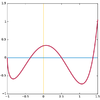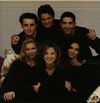Template:Featuredarticle/queue: Difference between revisions
| Line 64: | Line 64: | ||
=== 14 September 2012 === |
=== 14 September 2012 === |
||
{{FeatArticleImg|Ecliptic-path.jpg|100px|link=Astrology}} |
{{FeatArticleImg|Ecliptic-path.jpg|100px|link=Astrology}} |
||
| + | '''[[Astrology]]'' is a system used by women and homosexual men to blame their actions, personalities and behaviors on the sun's apparent path across the sky over the course of a year. This path, called the eclpitic, traverses[1] a ring of constellations, which are essentially poorly designed celestial connect-the-dots puzzles made of stars. |
||
| − | '''[[Astrology]]''' text text text. This is example text, replace it. Use roughly 2 or 3 paragraphs from the article. Replace this text. Avoid whitespace at the bottom. '''([[Astrology|more]]...)''' |
||
| + | Despite the fact that you can't see the stars behind the sun, the particular connect-the-dots puzzle that the sun appeared to be passing through on the day you were born (your star sign) determines not only your personality but the way you ought to behave on any given week or day[2] (your horoscope). |
||
| + | Generally speaking, straight men are immune to the effects of astrology. This is either due to their inability to understand emotion on any level, or due to their superior intelligence. '''([[Astrology|more]]...)''' |
||
Revision as of 18:36, 13 September 2012
08 September 2012
Lance Cleveland Manhands Armstrong III was born in Austin Texas in 1972. His father Chakademus was an Amish plumber, who was forbidden by his faith from using tools of any kind in his work, relying instead on his limbs and teeth to repair leaks and unblock toilets. Lance accompanied his father on many evening and weekend calls, and remembers seeing his father "sunk to the (arm)pits in human-links in the bathrooms of swanky houses in uptown Austin." These experiences convinced the young Armstrong that he would not be subject to a similarly grinding working existence. He determined to see the world and leave his mark. editIntroduction to cycling
Lance's first experience of cycling was at the age of 17 when he was forced onto two wheels by bullies at his high school. He had never ridden a bicycle prior to this due to a childhood fear of human-powered moving mechanical objects. His tormentors wished to exploit this phobia and see the cowering, tearful Armstrong flounder and fall. However, it became apparent from the first pedal stroke that Lance was a natural. He easily out-sprinted the would-be assailants and demonstrated remarkable bike-handling skills, popping wheelies and performing doughnuts with aplomb. (more...)
Hiroshima
- Article feature date: 9 September 2012
- Feature code:
{{FA|date=9 September 2012|revision=6532529}}(Only add this after this page has saved) - Remove this section now.
09 September 2012
Founded in 1589, Hiroshima grew to be a bustling city during the Meiji Era. Seated in a natural bowl of flatland, the area combined the benefits of water access with large amounts of farmland, and became a center of commerce. Conquered by Tokugawa Ieyasu a half century after its formation, it changed political roles several times before becoming the center of Hiroshima prefecture - a fortuitous event that helped the city grow to a bustling metropolis of several hundred thousand people. That was, of course, until the merciless soul of an atom, like the mighty dragon of legend, swooped upon the helpless lives clustered together in fear below, and, rending itself in twain, struck with a horrible wrath so brilliant that even angels averted their eyes from the sight that stretched out before them, a truly gruesome throw of despair.(more...)
Peacock
- Article feature date: 11 September 2012
- Feature code:
{{FA|date=11 September 2012|revision=6241640}}(Only add this after this page has saved) - Remove this section now.
11 September 2012
A peacock is a type of Australian pest best left unsaid. Adorned with things all over its head, body, and tail, colors bursting out lightshow style amid feathers the softness of baby's thigh, the whole thing drenched in sunshine seasoning mixed with that thing you inhale from the hot-breath of philipino back-room scented ring-toss hostesses, the peacock has friends in high places and seldom goes home alone.
Peacocks were discovered by the early settlers of Australia (not counting the primitive Australian black midgets who managed to hang out with peacocks for millenia without causing much fuss or evidently discovering them) in the summer of 1815, when a white man by the name of Brent wandered into an aboriginal tribal encampment and saw strange colorful birds aplenty just pecking about and spreading colors like colors were air or water or something. Long bird feathers were brought to Brent when he eventually asked politely, and upon discovering them he proclaimed a new find and named it after his wife's sister's pet name for his flightless winged dingy.
The fragile bird, no larger than a bald eagle and able to run faster than Bannister himself, became the favorite of the crown and appeared regularly in Barnum 'n Bailey's traveling sideshow. Let loose by decree to appear and then run wild in zoos, city parks, and neighborhoods about town, a peacock's sudden appearance amongst the low-level in-need-of-a-decontamination-unit which is the average urban back yard brings surprised "oohs" and "aahs" to the throats and well up into the voice boxes of hundreds of asthetically color-starved citizens. Few give chase to the street-named kaleidoscope bird, and, as a rule, admire it from afar or from very close up as the case and pecking order may be. Children collect the feathers as they fall, and sell them to cooch dancers. (more...)
Function (mathematics)
- Article feature date: 12 September 2012
- Feature code:
{{FA|date=12 September 2012|revision=6394876}}(Only add this after this page has saved) - Remove this section now.
12 September 2012
A function is a relatively simple mathematical tool, used by great professors and not-so-great professors alike as a vital application to various numbers here and there to transform them into different numbers, but using the same process. This factor of regularity makes the function a fairly crucial aid in the mathematical equivalent of working in a Tibetan iPad packaging plant. Nevertheless, the sheer determination of those attempting to use the functions for a task as monotonous as the wrapping of poorly constructed imitation tablet computers made of cardboard and horse testicles is near incomparable with the mathematical geniuses of maths's heyday.
Yes, such innovative use of functions is scant in this modern world of failing economy and MS Calculator. The great functions and formulae of the days when mathematics was valued above such things as charity and prostitution were simple things, yet elegantly complicated in the array of practical yet overly long sums the masters would come up with. Unfortunately, the limited attention span of the new generation faces us with a scarcity of four-dimensional thinking and an abundance of lustful masturbation in males. (more...)
HowTo:Make a sitcom
- Article feature date: 13 September 2012
- Feature code:
{{FA|date=13 September 2012|revision=6522446}}(Only add this after this page has saved) - Remove this section now.
13 September 2012
Have you ever felt... bored? Or maybe... unimpressed? Unimpressed with the quality and worthlessness of your life? What have you ever done to make you different from all the rest? You're ugly, your jokes aren't funny, you suck. As you sit there in front of the television, gulping down your millionth bottle of beer and staring into the lives of fictional characters that don't even exist, you despise yourself. You look at what you've become, a fat ugly unfunny slob, and at that moment, you hope there is something redeeming you can do. Something to get you noticed, and to make up for all those wasted years.
Then you look into the televison, tears streaming from your fat cheeks, and you look at those made up characters, living in a perfect (and constantly hilarious) world of dead childeren and graphic mutilation. That's it! You'll make a sitcom! Ahh, the sitcom. Also known as the situation comedy, it is television's finest trope, the source of the laughter today. True, what He bestowed on the sitcom, He bestowed on little else. Anyway, now that you know what you are doing, it's time to find out what you're going to do. Ayyy! (more...)
Astrology
- Article feature date: 14 September 2012
- Feature code:
{{FA|date=14 September 2012|revision=6421246}}(Only add this after this page has saved) - Remove this section now.
14 September 2012
'Astrology is a system used by women and homosexual men to blame their actions, personalities and behaviors on the sun's apparent path across the sky over the course of a year. This path, called the eclpitic, traverses[1] a ring of constellations, which are essentially poorly designed celestial connect-the-dots puzzles made of stars. Despite the fact that you can't see the stars behind the sun, the particular connect-the-dots puzzle that the sun appeared to be passing through on the day you were born (your star sign) determines not only your personality but the way you ought to behave on any given week or day[2] (your horoscope). Generally speaking, straight men are immune to the effects of astrology. This is either due to their inability to understand emotion on any level, or due to their superior intelligence. (more...)





